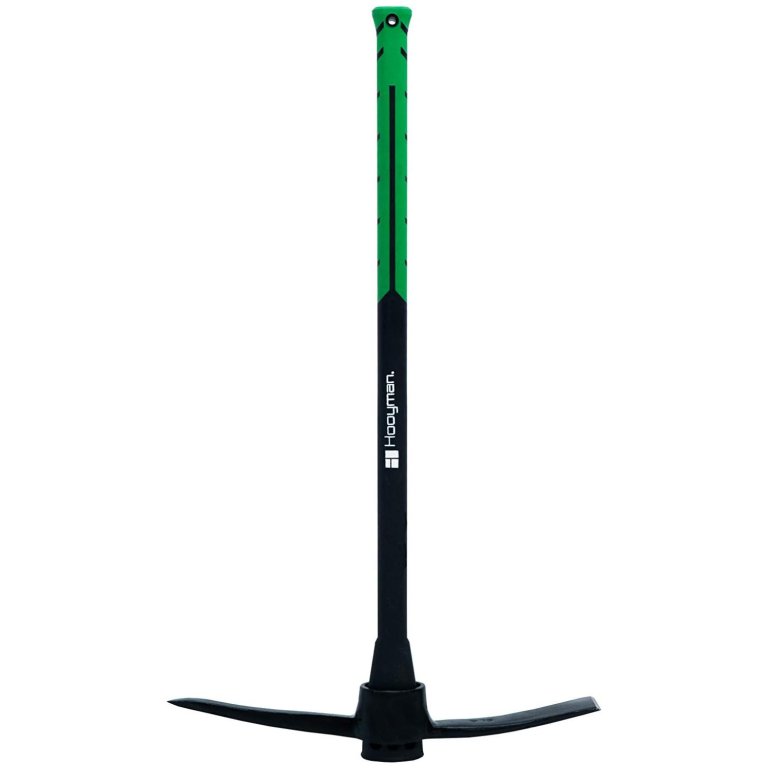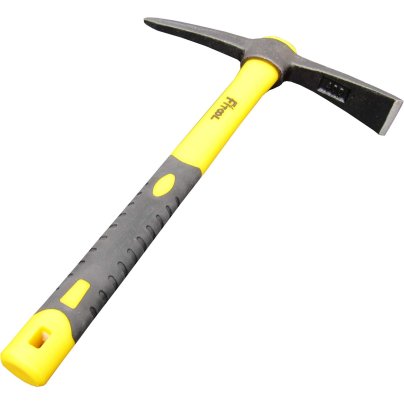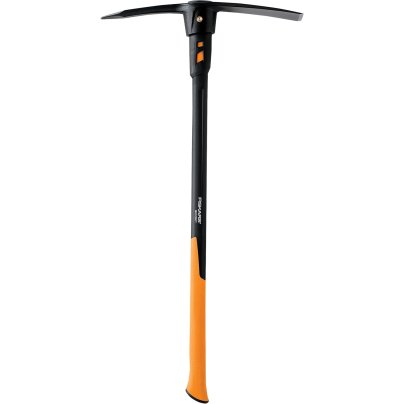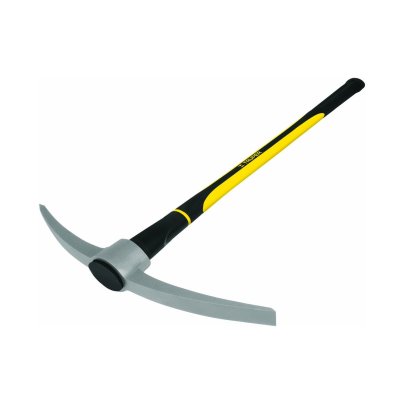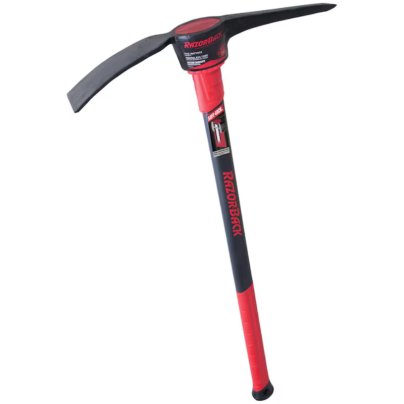

We may earn revenue from the products available on this page and participate in affiliate programs. Learn More ›
While a shovel may be the first thing one reaches for to dig a hole, when it comes to breaking through hard, rocky soil, a pickaxe is the tool of choice. Famous for its use in the construction of the Great American Railroad in the 19th century, the head of a pickaxe has a pointy pick on one side and a flat wedge-shaped side on the other, hence the name “pickaxe.”
While the pickaxe’s days of excavating earth to make way for the Iron Horse may be over, their ability to break up compacted soil, large rocks, and tree roots makes them essential in the world of gardening and landscaping. After testing five popular models in our own backyard and an overgrown area next to it, we chose the Hooyman Pick Mattock with Heavy-Duty Forged Head as the best overall model for its ergonomic design, versatility, durability, and overall value. Read on to learn more about why the Hooyman topped our list of the best pickaxes and see which other models we recommend.
Pickaxes Comparison
| Product | Weight | Handle length | Handle material |
|---|---|---|---|
| Hooyman Pick Mattock with Heavy-Duty Forged Head | 5 pounds | 36 inches | Fiberglass with rubberized grip |
| Fitool Forged Adze Hoe and Pick | 1.4 pounds | 15 inches | Fiberglass with plastic coating and rubberized grip |
| Truper 31646 6-lb. Railroad Pick | 6 pounds | 36 inches | Fiberglass with rubberized grip |
| Fiskars Pro IsoCore 5-lb. Pickaxe | 5 pounds | 36 inches | Dual-layer fiberglass and anti-vibration insulating materials with rubberized grip |
| Ames RazorBack 5-lb. Pick Mattock | 5 pounds | 34 inches | Fiberglass with rubberized grip |
Best Overall
Photo: AmazonWhat We Like
- Durable 1045 high-carbon steel head
- Head is epoxy-sealed to the handle for security
- Ergonomic no-slip handle is comfortable to grip
- Reinforced fiberglass core for strength
What We Don’t Like
- 5-pound head a bit heavy for some users
- 36-inch handle is too long for small spaces
Product Card
- Weight: 5 pounds
- Handle length: 36 inches
- Handle material: Fiberglass with rubberized grip
The Hooyman pick mattock with a heavy-duty forged head feels like it was built for serious work. From the first swing, its solid weight and balance felt good in the hands of both our testers: one 6 feet 1 inches tall and the other 5 feet 4 inches tall. The 1045 high-carbon steel head made quick work of cutting through compacted soil in a neglected landscaping plot, tangled grapevine roots attempting to take hold on a nearby tree, and mixed rocks and gravel in an empty lot next to our property.
One of our favorite features of the Hooyman pickaxe was its no-slip grip. The 5-pound head was a fair bit to swing for our smaller tester, but the handle felt comfortable and secure even when her hands got sweaty. The fiberglass core seemed strong and sturdy, and the epoxy-sealed head-to-handle connection never wobbled, even after extended use. The dual-head design—one side a pick, the other an adze—gave us the versatility needed for both breaking ground and prying up stones. At 36 inches long, it’s a bit big for smaller spaces, but that’s true of any full-size tool. When the work is done, there’s a convenient peg hole for hanging—a small feature that’s notably absent in many models.
What our tester says: “It was a tight race for first place between the Hooyman pickaxe and the Fiskars, but ultimately the Hooyman took first because of its value. It’s comfortable, durably made, and has a couple of convenient extras at a great price.”—Michelle Larson, Product Reviews tester and writer
Get the Hooyman pickaxe at Amazon, Lowe’s, Ace Hardware, or Hooyman.

More Pickaxes Worth Your Money
We liked every gardening mattock and pick for digging we tested for this guide, which doesn’t always happen. Depending on your size, the task at hand, and your budget, one of the options below might be a better fit.
How We Tested the Best Pickaxes
| Products tested | 5 |
| Time spent testing | 4 hours |
| Tests performed | 6 |
| Price range | $15 to $75 |
To find the best types of pickaxes for a range of outdoor tasks, we started by assessing more than a dozen options for their perceived durability, ergonomics, and usefulness. We narrowed those choices down to five, all of which have lightweight fiberglass handles for absorbing impact and strong steel heads built to withstand heavy-duty use. We prioritized rubberized grips that would allow us to get a good hold and included both full-size axes for splitting large rocks and mini pickaxes for gardening and cultivating.
We then spent several hours putting each model through a series of real-world tests. We used them to break up compacted soil, lift heavy rocks, and cut through tangled vines. During testing, we paid close attention to grip comfort and ergonomics, noting how secure each handle felt in our hands and in connection with its head, as well as how much vibration transferred through the shaft as we worked. We evaluated weight and balance during extended use, as these factors have a significant impact on how easy a mattock tool is to control.
Finally, we assessed durability by checking for chips, loose heads, and handle wear after use. And since we don’t have a dedicated garden tool organizer in our shed, we gave the two pickaxes with peg holes (the Hooyman and the Fitool) a little bump in their value scores.
| Product | Functionality | Ergonomics | Durability | Value |
| Hooyman Pick Mattock with Heavy-Duty Forged Head | 5/5 | 4.7/5 | 4.8/5 | 5/5 |
| Fitool Forged Adze Hoe and Pick | 4/5 | 4.3/5 | 4.5/5 | 4.8/5 |
| Truper 31646 6-lb. Railroad Pick | 4.8/5 | 4.3/5 | 4.8/5 | 4.8/5 |
| Fiskars Pro IsoCore 5-lb. Pickaxe | 5/5 | 4.7/5 | 4.8/5 | 4.5/5 |
| Ames RazorBack 5-lb. Pick Mattock | 4.8/5 | 4.5/5 | 4.8/5 | 4.3/5 |

FAQs
If you’re wondering how a pickaxe differs from a mattock or another type of axe or how you might use one, read on for answers to these and other commonly asked questions about these outdoor tools.
Although the terms are often used interchangeably, the pickaxe and mattock are not exactly the same. A mattock is a hand tool with a horizontal adze blade for digging and chopping roots, combined with either a vertical axe blade (cutter mattock) or a pointed pick blade (pick mattock). A pickaxe, in comparison, has a pointed pick side and an adze blade side, designed primarily for breaking hard, rocky ground.
A pickaxe is commonly used in farming and landscaping to break up hard or rocky soil or to dig a hole for new plantings. Pickaxes that have an adze end are also useful for removing weeds.
Clean your pickaxe by brushing off any caked-on dirt or debris after use. If the pickaxe is wet, dry it off before putting it away. See our guide on how to care for garden tools for additional pointers.
While it is possible to use a pickaxe for interior demolition work, it’s not really designed for this purpose. A pickaxe is more likely to cause more collateral damage, which could impact plumbing and electrical systems. A sledgehammer is better suited for this type of work.
Ash and hickory are the best wood species for a pickaxe or mattock with a wooden handle. These hardwoods are very strong and have a small amount of flex that allows them to absorb impacts.
Meet the Tester
Michelle Larson has been a writer and editor for more than 10 years in the fields of health, business, and the home. Because she’d rather spend a little more up front than buy a tool or appliance twice, she strongly believes in the power of testing for finding quality items that are meant to last.
Additional research provided by Tony Carrick.
